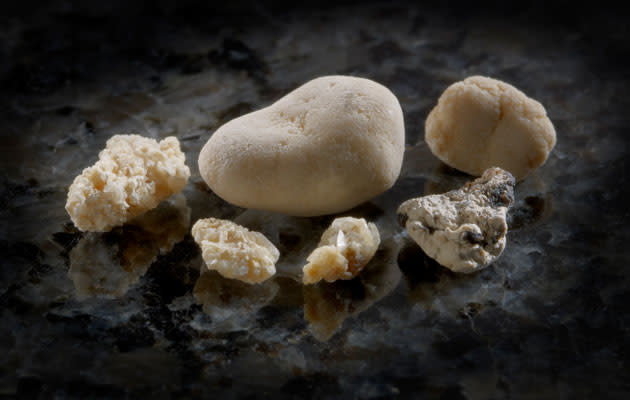 Fit to Post Health
Fit to Post HealthAre you at risk of kidney stones?
If you’re overweight and regularly consume too much food and beverages high in sodium and oxalates, you run a higher risk of developing a kidney stone, especially if you don’t hydrate yourself properly.
A kidney stone is a hard deposit that forms within the urinary system of the kidney. It usually occurs when minerals, such as calcium, oxalate, uric acid, phosphate, combine and crystallise in the urine.
“Kidney stone or renal stone disease is a very common condition around the world. It is estimated to affect 2-3 per cent of the general population. In affluent countries like Singapore, it is linked to obesity and a high dietary intake of salt, protein and oxalate-rich foods,” says Dr Nor Azhari Bin Mohd Zam, a consultant with a special interest in the diagnosis, treatment and prevention of renal stone disease, at the Department of Urology, Singapore General Hospital (SGH).
Related article: How much salt is in your favourite hawker foods like chicken rice?
What are the symptoms of kidney stone?
A kidney stone is not always symptomatic at an early stage. Pain and other symptoms of kidney stone may show up only when the stone has grown large in size and moves down the ureter, the tube that connects the kidney to the bladder.
“At this stage, the stone can cause spasms and blockage of the kidney. The pain can be so intense that the patient may roll around on the floor,” says Dr Nor Azhari.
Common symptoms of a kidney stone include:
Abdominal pain, which typically radiates from the loin to the groin
Blood in the urine (hematuria)
Recurrent urinary tract infections (UTI)
Kidney stone causes and risk factors
There are many different types of kidney stone such as calcium stones (the most common), uric acid stones, struvite stones and cystine stones.
A kidney stone typically forms when the urine contains more minerals than it can dilute. Additionally, the urine may lack the substances to prevent these minerals from sticking together.
The main factors which can increase your risk of developing a kidney stone fall in the following five categories.
1. Environmental factors:
Hot climate
“The main environmental factor is living in a hot climate, where decreased fluid intake coupled with excess sweating can lead to low urine volume and an increased concentration of certain minerals in the urine,” says Dr Nor Azhari.
2. Dietary factors:
Low fluid intake
High intake of foods rich in salt (sodium)
High intake of purine- and oxalate-rich foods
• Oxalate-rich foods, e.g. peanuts, almonds, chocolates, strawberries, blueberries, asparagus, spinach, wheat bran
• Oxalate-rich beverages, e.g. tea, coffee, beer, soy drinks
• Purine-rich foods, e.g. organ meats, shellfish, sardine, anchovies
Related article: Want to see the complete list of foods high in purine?
3. Hereditary factors:
Family history of kidney stones
“Individuals with a strong family history have 2-3 times the risk of developing a kidney stone compared to those who do not,” says Dr Nor Azhari.
4. Medical factors:
Medical conditions such as hypercalcemia (increased levels of calcium in the blood), gout, renal tubular acidosis, chronic diarrhoea and bowel disorders.
Individuals with these conditions are at increased risk of developing kidney stones.
5. Anatomical factors:
Structural abnormalities in the kidneys and urinary system leading to obstruction or stasis of urine.
Patients with conditions such as horseshoe kidneys, medullary sponge kidneys, renal calyceal diverticulum and pelviureteric junction obstruction, are at increased risk of developing kidney stones.
Related article: What can you do to avoid getting kidney stones? These doctor’s tips can help
FREE Doctor Q&A: Kidney failure can arise from a variety of causes from the most common: poorly controlled diabetes and hypertension, to inflammatory diseases and kidney stones. Take this opportunity to send us any question you may have about renal conditions.
Public Forum: Keen to know more about prostate cancer, urinary symptoms, kidney stones or kidney cysts? Sign up for our public forum on common urological diseases, organised by the SGH Urology Centre on Saturday, 12 October 2013, 9:30am-5pm. The forum will be held in English, Mandarin and Malay. Venue: HPB Auditorium, 3 Second Hospital Avenue, Level 7. Entrance fee: $5/pax/per session. To register, please call 65767658 / 63265151 between 9:30am and 5:30pm.
Get more health tips at HealthXchange.com.sg and sign up for our FREE e-newsletter.
By Anjana Motihar Chandra for HealthXchange.com.sg.
Health Xchange's articles are meant for informational purposes only and cannot replace professional surgical, medical or health advice, examination, diagnosis, or treatment.



